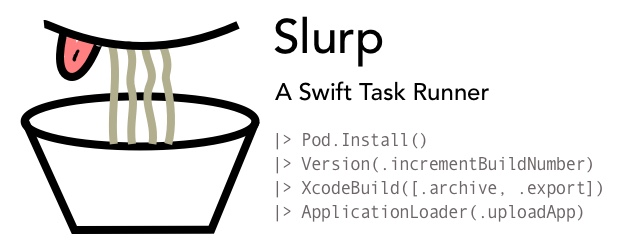A Swift task runner and file watcher that you can run from your Xcode Workspace or the Command line. Comes with everything you need to build and deploy an iOS app just by running an XCode Scheme. Inspired by Gulp.js.
- Intended Uses
- Installation
- Developing and Running in Xcode
- Available Tasks
- Writing your own task
- The Pipe Operator
- Roadmap
- Feedback
Build your Slurp Task module as an executable. Run it from your CI server, the command line or Xcode. For example, this code builds and deploys an iOS app to the iTunes App Store:
import Slurp
import SlurpXCTools
let xcBuildConfig = XcodeBuild.Config(...)
let uploadConfig = ApplicationLoader.Config(...)
let slurp = Slurp()
slurp
.register("buildAndDeploy") {
return slurp
|> Pod.Install()
|> Version(.incrementBuildNumber, all: true)
|> Version(.setMarketingVersion("1.0.1"), all: true)
|> XcodeBuild([.archive, .export], config: xcBuildConfig)
|> ApplicationLoader(.uploadApp, config: uploadConfig)
}
try! slurp.runAndExit(taskName: "buildAndDeploy")This is useful for development workflows that involve files generated from 3rd party tools (e.g. graphics editors). If you are looking for ways to develop in Swift without using Xcode, this may be useful for running tests and linters automatically also.
import Slurp
let slurp = Slurp()
slurp.watch(paths: ["Tests/**.swift"], recursive: true)
.flatMap { _ in
return try! slurp.run(taskName: "runTests")
}
.subscribe(onError: { err in
print(err)
})
RunLoop.main.run() // Keep the task running indefinitely$ git clone git@github.com:bitwit/Slurp.git$ cd Slurp && make- The Slurp CLI will now be installed and the repo copied to
~/.slurp/clonefor local reference in your projects
In the root of the project:
$ slurp init. This will create a new SlurpTasks package in<project root>/Slurp.$ slurp editwill open the the SlurpTasks Xcode project, but you can also add this project to your regular Workspace.$ slurpwill run your SlurpTasks executable
A basic Sources/SlurpTasks/main.swift file would look like:
import Slurp
let slurp = Slurp()
slurp.register("sayHello", Shell(arguments: ["echo", "hello world"]))
try! slurp.runAndExit(taskName: "sayHello")When you run your Tasks from XCode it will execute from the build folder. To get around this there are several ways to set the current working directly correctly:
- Set it at the top of your main.swift
Slurp.currentWorkingDirectory = "/path/to/app"- Pass it as an environment variable
$ SLURP_CWD=/path/to/app slurp
- Change it at any point in the task flow
slurp
.register("example") {
return slurp
|> CWD("~/Development/personal/Slurp")
|> ...
}Note: You can pass this as an environment variable too through
SLURP_CWD. This can be set in your task scheme's configuration
This git repo contains an xcworkspace and example app that mimic this suggested structure.
- Shell
- Xcodebuild (
xcodebuild) - Version (
agvtool) - ApplicationLoader (
altool) - Cocoapods (
pod)
There are 3 ways to build your own task:
-
Simply register an RxSwift Observable
let myTaskObservable: Observable<Int> = Observable.create { observer in observer.onNext(100) observer.onCompleted() return Disposables.create() } slurp .register("myTask") { return myTaskObservable }
-
Use the
BasicTaskclass either directly or through inheritance. It can be initialized with either an RxSwift Observable or a callback function with a(Error?, T?) -> Voidmethod signatureopen class BasicTask<T>: SlurpTask { public init(observable: Observable<T>) public convenience init(asyncTask: @escaping ( (Error?, T?) -> Void ) -> Void) }
-
Make your class conform to the
SlurpTaskprotocol:public protocol SlurpTask { associatedtype OutputType func onPipe<U>(from input: U) -> Observable<OutputType> }
Note:
onPipe<U>'s generic format is mostly there for posterity since all current tasks do not consume from the previous task's output. This may change in the future, particularly for file system management tasks
Options 2 & 3, which involve conforming to SlurpTask, are eligible for piping to and from other tasks.
For convenience and cleanliness Slurp uses the pipe operator i.e |>. This is a substitute for calling func pipe(to: SlurpTask).
return slurp
|> XcodeBuild([.archive, .export], config: xcBuildConfig)
|> ApplicationLoader(.uploadApp, config: uploadConfig)Is equivalent to
return slurp
.pipe(to: XcodeBuild([.archive, .export], config: xcBuildConfig))
.pipe(to: ApplicationLoader(.uploadApp, config: uploadConfig))Some future desires/plans. Requests and contributions very welcome!
- Solidify API
- Slurp CLI
- Dry run flag
- Prettier output
- Improve Xcode integration flow
- Make more tasks. Personal wish list:
- Swiftlint task
- Slack API task
- File system tasks
- AWS S3 Management
- AWS Cloudfront
- Download Dsyms
- Upload Dsyms to New Relic (and others)
Feel free to open an issue or find me on twitter


